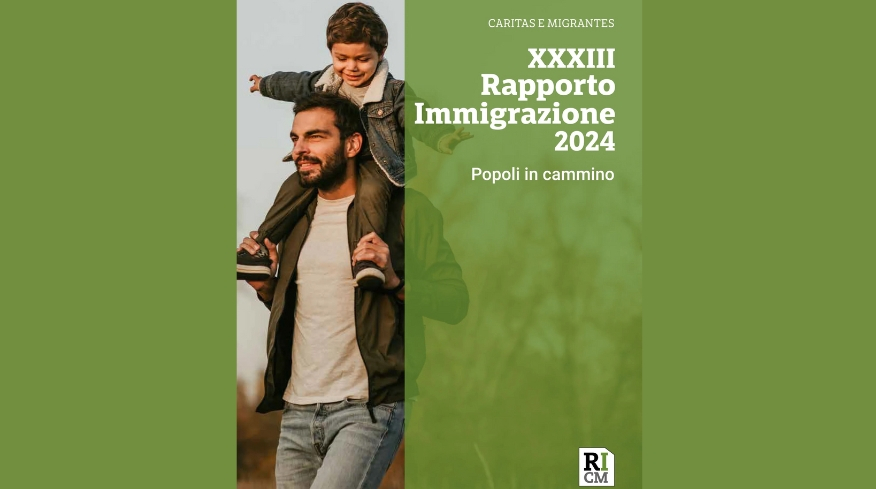
Migrantes, Report 2024 | Asylum rights increasingly at risk
Under the current policy of the European Union and the United States of America, the “right to asylum” for migrants is waning
This is shown in the eighth report “The Right of Asylum 2024. People on the road without the right to asylum” by the Italian Episcopal Conference’s Migrantes Foundation
Globally, people fleeing the world have surpassed 122 million due to war and famine, climate emergency and drought, emergencies that are growing larger by the year. In the Middle East, the war between Hamas and Israel has expanded to include the West Bank, Iran, and Lebanon. “Arms are the only talking points between Ukraine and Russia, while extreme situations related to climate change also contribute to the growing number of people forced to leave their homes and lands for an increasingly long time.”
By contrast, “our responses to the root causes of these forced migrations are not as swift, and too few government authorities and institutions are seriously and authoritatively pursuing goals of peace and justice, while a mad arms race continues.”
Shortly before the close of the last European legislature for the June 2024 elections, the Strasbourg Parliament approved the “new European Pact on Migration and Asylum,” a decidedly downward compromise with a “further impoverishment of the rights of asylum seekers and refugees.”
For years then, European and national policies have been pursued-those of Giorgia Meloni’s right-wing government is clear evidence of this-to restrict access to the continent and individual countries through ever more extensive and questionable practices of externalization: examples are the agreements with Turkey, Libya, Tunisia, Niger, and now Albania, a dastardly agreement, rightly blocked by the judiciary.
Despite the solemn declaration of the right to asylum as “inviolable”,
recent reforms limit access to that right.
In particular, “the introduction of expedited procedures and restrictions for asylum seekers at the EU’s external borders accentuates the use of detention in transit areas; and reduces the effectiveness of legal recourse against refoulement.
It also introduces the legal fiction of “non-entry,” which treats some asylum seekers as not present on the territory, allowing for restrictive measures and immediate rejections. The purpose is to restrict access and rights of asylum seekers and refugees.”
Despite the Italian law’s ban on detention for “Unaccompanied Foreign Minors” (Msna), many minors are detained in inadequate centers – places where there is internet connection (hotspots) and government reception centers – and these de facto kids behind bars are in critical and promiscuous conditions with adults: “These centers do not guarantee adequate legal protection, nor the possibility of applying for asylum or residence permits, leaving minors in a state of isolation and uncertainty.”
Law 176 of 2023-intended by Matteo Salvini and others-legalized the placement of MsNas over the age of 16 in adult facilities, a measure that runs counter to the best interests of the child as enshrined in the UN Convention on the Rights of the Child (1989).
The repeated violations of fundamental rights have been confirmed by rulings of the European Court of Human Rights, which has condemned Italy for inhuman and degrading treatment of minors placed precisely in adult facilities. Despite the convictions, however, practices have not been changed and emergency management continues to prevail.
“A pity because in general,” Migrantes concludes, ‘the regulations concerning minors in our country are among the most advanced in Europe,’ and it is thanks to center-left governments, certainly not right-wing governments.
One chapter of the report is devoted to nuns. How so?
It highlights how in Italy “the experience of the ”frontier”
is interpreted in varied and multifaceted ways by religious women.Their communities, from Sicily to Lombardy, are exposed to difficult situations,
providing humanitarian assistance to migrants facing poverty, violence and social vulnerabilities.
They often work in collaboration with local authorities, lay associations and health facilities,
but they struggle with insufficient resources and political
They build pathways to redemption particularly in favor of trafficked women.”
An example in Turin comes from the Christian Famulato founded in 1922 by Venerable Adolfo Barberis, which for decades has been welcoming and integrating immigrant women, especially from South America.
The report highlights a wide variety of responses and experiences, from dormitories for migrants in transit to educational facilities for women and children. “Women religious are animated by a charism that interweaves faith and social justice and seeks to overcome cultural and religious divisions. While their witness, a true example of solidarity resistance, underscores all the discomfort of “borders” and the need for more inclusive policies. The sisters affirm the importance of public interventions for a better management of migration, stressing that only through the active involvement of all institutions will it be possible to build a more just and welcoming society.”
Migrantes’ report is, of course, limited to Italy. But the world situation has definitely worsened since the “sheriff of Washington” was improperly installed in the White House and was able to implement his criminal policy-supported by shady figures such as James David Vance and Elon Musk-of which the migrants chained and dragged on the plane to be returned to their countries are a photographic demonstration.
